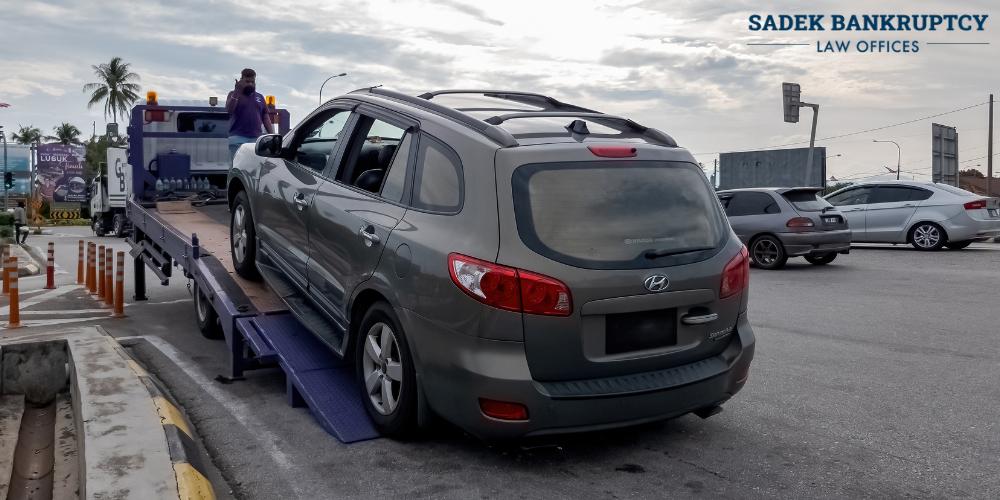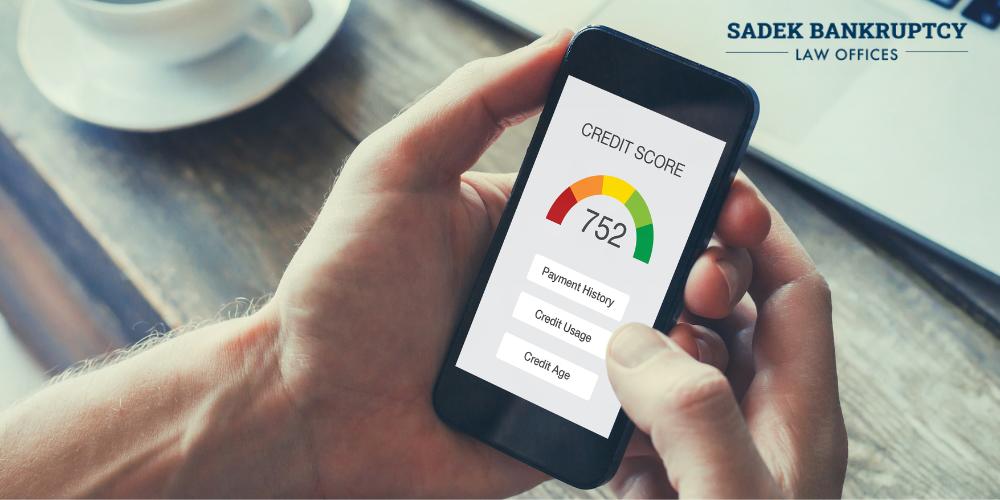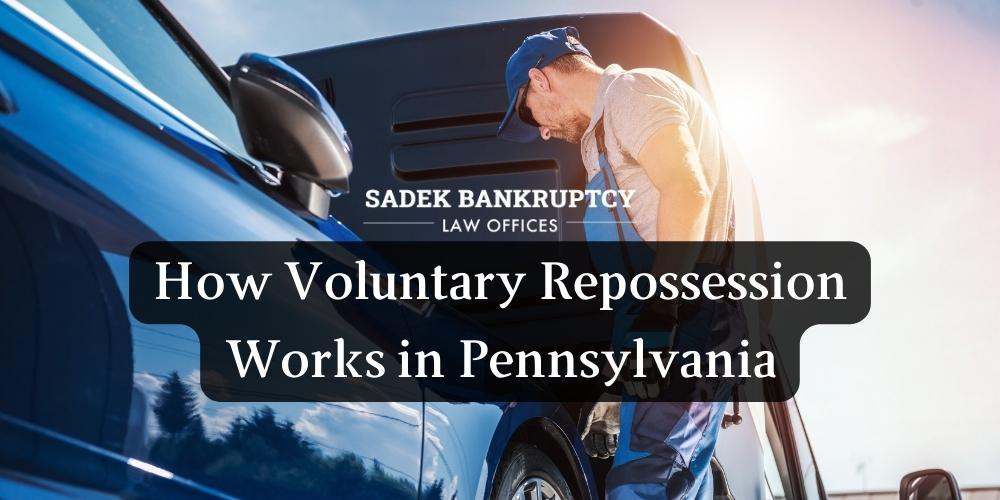Has your car payment left you feeling in over your head? Many clients in the same position eventually consider returning their car voluntarily to a company that might soon be repossessing it anyway. This is called a “voluntary repossession.“
Is voluntary repossession a smarter option than declaring bankruptcy and getting an automatic stay? The experienced Philadelphia repossession lawyers at Sadek Bankruptcy Law Offices are here to help you navigate this complicated process. To schedule a free consultation with us about your case, please call our office at 215-545-0008 today.
What Is Voluntary Repossession in Pennsylvania?
Voluntary car repossession occurs when a borrower willingly surrenders a financed asset to the lender due to an inability to continue making loan payments. This process allows the borrower to avoid the expenses and hassles associated with involuntary repossession, where the lender seizes the asset without the borrower’s consent.
Voluntary Repossession vs Involuntary Repossession
Voluntary repossession and involuntary repossession differ primarily in how the asset, such as a vehicle, is surrendered to the lender. In voluntary surrender, the borrower chooses to hand over the asset to the lender after recognizing the inability to meet payment obligations, potentially reducing additional fees and avoiding the confrontation of a forced seizure.
In contrast, involuntary repossession involves the lender taking back the asset without the borrower’s consent, often using a repossession agency. This method can be more distressing and disruptive for the borrower and may incur higher costs, exacerbating the borrower’s financial difficulties. Many people choose voluntary repossession because of the benefits it offers over regular repossession.
Voluntary Repossession With No Late Car Payments
Voluntary repossession with no late car payments is a situation where a borrower chooses to surrender their vehicle to the lender even though they are not behind on payments. This might occur when the borrower anticipates financial difficulties that will prevent them from making future payments, or when they realize they can no longer afford the vehicle due to changes in their financial circumstances.
Opting for voluntary repossession in such cases can be a proactive measure to avoid accruing debt and additional late fees. It might also slightly lessen the negative impact on their credit score compared to defaulting on car loan payments later on. This approach allows the borrower to manage the situation in a more controlled manner and potentially negotiate better terms for resolving any remaining debt after the vehicle is surrendered and sold.
How Does a Voluntary Repossession Work in Pennsylvania?

Voluntary repossession works by the borrower initiating contact with the lender to inform them that they can no longer make payments on their loan and wish to surrender the asset, such as a vehicle. After notifying the lender, the borrower typically arranges a time and place to return the asset. The lender then takes possession of the asset and proceeds to sell it, often at auction.
The sale proceeds go towards paying off the outstanding loan balance. If the sale does not cover the full amount owed, the borrower remains liable for the difference, known as the deficiency balance. This process helps avoid some of the additional costs, such as the lender’s repossession costs, and the negative impact of having a repossession agent forcibly retrieve the asset.
How to Initiate a Voluntary Repossession of a Car
To initiate a voluntary surrender of a car, the borrower should first contact their lender to inform them of their inability to continue making payments and their desire to surrender the vehicle. It’s important to discuss and understand the terms, such as any potential financial obligations remaining after the car is sold. The borrower and lender will then agree on a time and place for the vehicle to be returned.
Pros and Cons of Voluntary Repossession
Voluntary repossession offers several benefits, primarily reducing the emotional and financial stress associated with involuntary repossession. By voluntarily returning the vehicle, the borrower avoids the discomfort and unpredictability of having a repossession agent show up unexpectedly to seize the vehicle, which can be both embarrassing and inconvenient.
Furthermore, voluntary repossession may incur fewer fees than involuntary repossession, as costs associated with the repossession agent and related administrative fees are generally lower. This method also allows the borrower to potentially negotiate the terms of the debt settlement or the deficiency balance with the lender, which might result in more favorable conditions for resolving any outstanding obligations.
However, voluntary repossession still has significant drawbacks. Like an involuntary repossession, it will negatively impact the borrower’s credit score, making future borrowing more difficult and potentially more expensive. The credit report will record the repossession, signaling to potential creditors that the borrower has previously failed to fulfill a loan obligation, which can affect creditworthiness for years.
Additionally, suppose the lender sells the vehicle, and it does not cover the full amount owed on the loan. In that case, the borrower is responsible for the deficiency balance, which is the difference between the sale price of the vehicle and the remaining loan balance. If the borrower does not pay this deficiency, the lender can sue the borrower after repossessing the car. This can place serious undue stress on the borrower, especially after losing their vehicle.
Is Voluntary Repossession a Good Idea?
Voluntary vehicle repossession can be a reasonable option under certain circumstances. It’s typically considered when a borrower cannot continue making car payments, and other solutions like refinancing or selling the vehicle privately aren’t feasible.
By choosing voluntary repossession, a borrower can avoid some additional costs and the negative experiences associated with involuntary repossession. However, it still negatively impacts one’s credit score and can result in owing a deficiency balance if the proceeds from selling the vehicle don’t cover the loan.
How Bad Is Voluntary Repossession?
Voluntary repossession is a serious financial decision that can have significant negative implications. Similar to involuntary repossession, it will adversely affect your credit score, potentially lowering it by 100 points or more. The repossession will remain on your credit report for up to seven years, which can hinder your ability to obtain loans or favorable interest rates in the future.
Moreover, you might still owe a deficiency balance if the sale of the repossessed asset doesn’t cover the full amount of the loan. Despite these downsides, it can be a preferable alternative to involuntary repossession, offering a more controlled resolution to an unmanageable debt situation.
Does Voluntary Repossession Hurt Your Credit?

Your credit will be impacted more or less the same way.
A voluntary repossession affects your score like a regular repossession on your credit report. It remains on your report for seven years from the date you began falling behind on your payments.
If you’re contemplating voluntary repossession to save your credit history, you should be aware that this tactic will not work.
Voluntary repossession is really only good for making sure you don’t get stranded by a surprise repo either at home or at work.
How Long Does Voluntary Repossession Stay on Credit Report?
Voluntary repossession, much like missed payments, typically stays on your credit report for up to seven years from the date it was reported. During this time, it can significantly impact your credit score and make obtaining loans or credit cards with favorable terms challenging.
What Happens After a Voluntary Repossession?
After a voluntary repossession, the lender or collection agency will sell the repossessed asset to recoup some of the outstanding debt. If the sale doesn’t cover the full amount owed, you may still be responsible for the deficiency balance. The repossession will negatively affect your credit score, making it harder to obtain loans or credit in the future.
Can You Get Another Car Loan After a Voluntary Repossession?
Yes, it’s possible to get another car loan after a voluntary repossession, but it may be more challenging and come with less favorable terms. Future lenders may view you as a higher risk borrower due to the repossession on your credit history, resulting in higher interest rates or larger down payment requirements. Building a positive credit history and demonstrating responsible financial behavior can improve your chances of obtaining another car loan in the future, albeit with some difficulty initially.
Do You Still Owe After a Voluntary Repossession?

You may still owe some money on the car.
When you return the car it will be auctioned off to a new owner. However, the car will generally be auctioned for far less than it’s worth. The difference between what it fetches and what you owe may be even greater than the difference between the car and its worth, thanks to interest rates and fees, such as storage fees.
The price of the car will be deducted from the remaining balance, but the car company will continue to try to collect. They may even sue you to get what they want, which can come with a whole host of unpleasant consequences.
In some instances, it is possible for you to pay only the actual value of the car without any interest or fees. It’s crucial to speak with a Philadelphia bankruptcy lawyer to ensure you are protected.
Call a Philadelphia Repossession Lawyer at Sadek Law Today
Filing for bankruptcy will help you protect yourself.
Let’s face it. Unless you live in a major metropolitan area with truly outstanding public transportation options, you probably need your car. If you’re behind on your payments it’s smarter to find a way to keep the vehicle in your driveway.
If you think you’re in danger of losing your car, it may be time to contact an experienced bankruptcy attorney. Filing for bankruptcy will grant you an automatic stay, allowing you to keep the car while we help you navigate the bankruptcy process. You may even be able to keep the car in the end while placing yourself in a better financial situation overall.
So before you turn over the keys, call us, the attorneys at Sadek Bankruptcy Law Offices. We offer a free consultation, fair payment plans, and a way back to financial stability.





